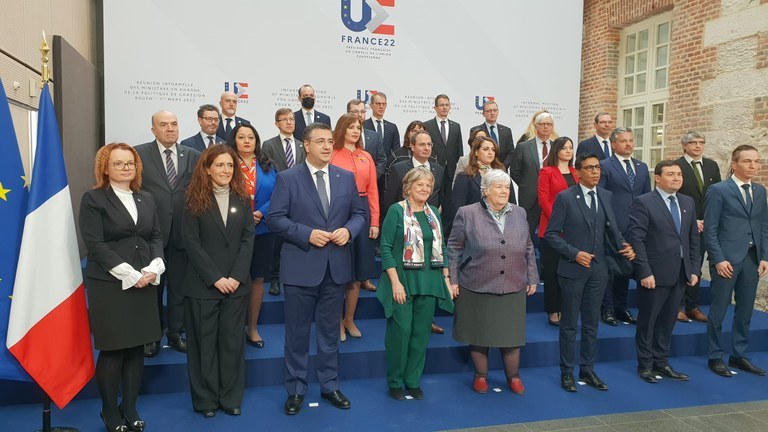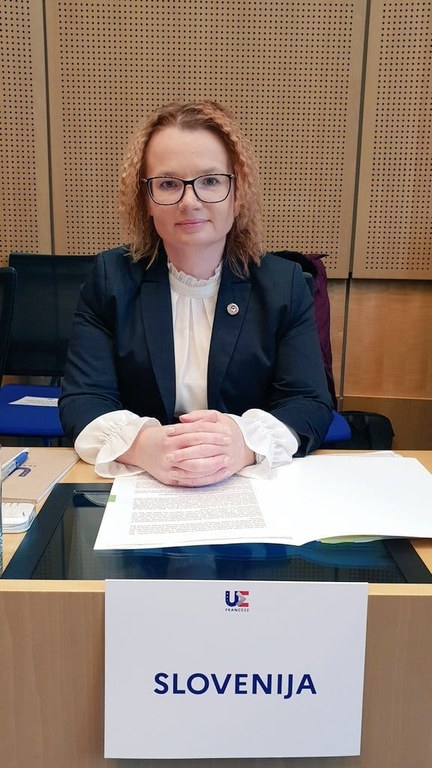State Secretary Kirbiš Rojs at informal meeting of EU ministers responsible for cohesion policy

Rouen, 1 March 2022 - State Secretary mag. Monika Kirbiš Rojs attended an informal meeting of EU ministers responsible for Cohesion Policy which was held under the auspices of the French Presidency of the Council of the EU. The meeting focused on the findings of the Eighth Report on Economic, Social and Territorial Cohesion and on the future of Cohesion Policy. Representing Slovenia, mag. Monika Kirbiš Rojs took part in the discussions on the public investment to be mobilised through Cohesion Policy to address European and global challenges, and on common approaches to bridge the growing disparities that have become a cause for discontent in certain parts of the Union, and have affected the European Union as a whole.
The two-day meeting aimed to put spotlight on the challenges identified in the Eighth Cohesion Report and on the ways forward for Cohesion Policy to be successful in achieving its goals and addressing its challenges.
State Secretary started her intervention by expressing support for Ukraine. She stressed that the fight for Ukraine was also a fight for Europe. She said that only a successful resolution to the conflict would allow Europe to further develop successfully. ‘’Slovenia expresses its solidarity with Ukraine and its people. Without peace and stability across Europe, all our efforts in other areas will be in vain.’’

State Secretary said that the crisis in Ukraine was happening in challenging times. The European Union and Cohesion Policy have not yet fully recovered from the Covid-19 pandemic but were already full steam ahead with comprehensive programmes and numerous activities for the programming period 2014-2020, the React-EU initiative, the Recovery and Resilience Mechanism and the new programming period 2021-2027. Referring to the current situation in Slovenia, Ms Kirbiš Rojs said that the country adopted a set of targeted and timely measures to respond to the pandemic, which resulted in economic growth and low unemployment rates; this helped the country avoid the worst economic consequences of the pandemic.
According to State Secretary, the European Union should adequately address a number of challenges to achieve its goals, and should use the solutions offered by Cohesion Policy in this respect. The Eighth Cohesion Report maps future action and is coherent with the challenges Slovenia identified in its programming documents, in particular in the area of green transition. State Secretary called for tackling the challenges relating to unfavourable demographic trends across Europe, and particularly in Slovenia. ‘’The Report clearly outlines the areas where countries perform best and the areas where investment needs are biggest. If we take on board the recommendations made in the Report and channel cohesion funds in the right and effective way, I’m sure the European Union will stay successful in the future.’’

Mag. Kirbiš Rojs also underlined that specific needs of micro-regions, remote areas and various target groups should be taken into consideration and adequately addressed. She called for stronger cooperation at all levels, increased investment in people and infrastructure and continued efforts to build the citizens’ trust. She concluded her intervention by looking to the future: ’’Trust, transparency, understanding different needs and looking at cohesion projects as a whole are the right reasons to continue our efforts and the way to assess the results of our efforts. I’m certain that, if we take into due account all these elements, we’ll be able to build a stronger and more resilient Europe.’’
